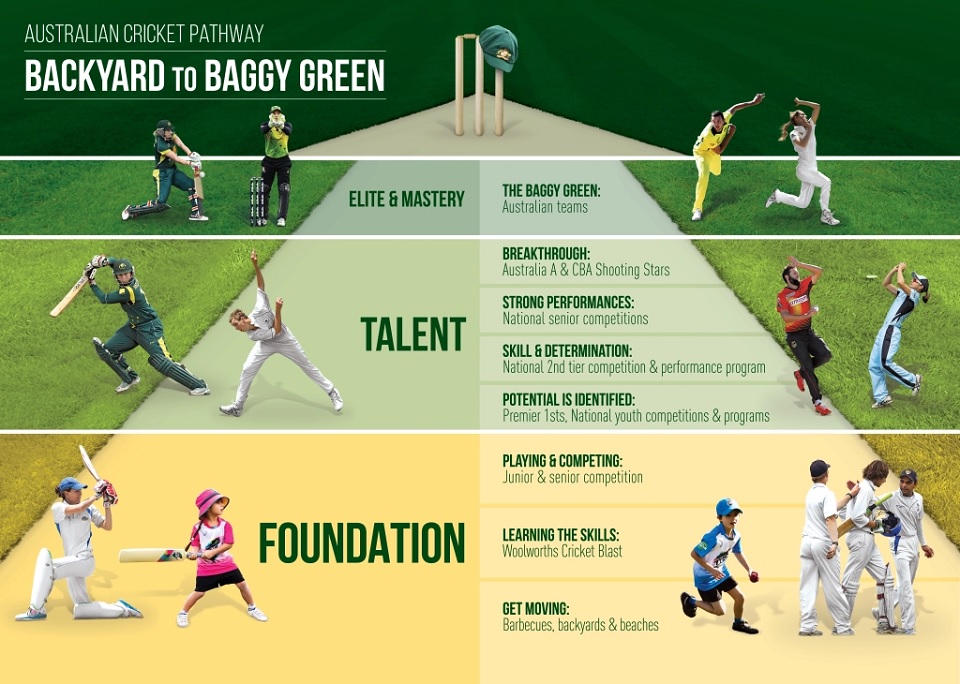Cricket Pathways to Success
Peter Procopis | August 07, 2023

Recently, I caught up with a friend whose fourteen-year-old son has fallen in love with cricket. The youngster lives and breathes the game, playing in multiple competitions, including State underage representative carnivals and challenges.
My friend is grateful to be able to share his love for the game with his son, even if it means carting him around to cricket during the Winter as well as the Summer. But he also explained how confused he was about how to help his lad take the next steps the game. The term that kept coming up in his utterings was ‘The Pathway’ or slight variations thereof. I immediately confessed that my understanding of ‘Pathways’ broad but rather shallow. I pointed him to the numerous explanatory public documents published by Cricket Australia and the various State Cricket authorities. I also flagged with him that each has their own pathway that reflects their particular requirements, but that they all feed into the national plan for talent identification and development overseen by Cricket Australia.
Once I’d passed on those basics, I delivered this caveat: whilst it’s worth gaining a basic knowledge of the system, there are a number of other things he should focus on in order to best help his son. Before I recall those things, it’s worth canvassing the numerous potential benefits for a youngster who participates in a pathway program:
1. Access to a range of learning opportunities through their Coaches- particularly at the older end of the youth pathways, there are numerous skilful, experienced and knowledgeable former cricketers who run the programs.
2. The opportunity to receive feedback on their progress through tough competition with most of the best players in their age group around their State or in the Country.
3. The opportunity to deepen their knowledge and understanding of peers who they could play with and against for many years to come.
4. The opportunity to begin building friendships with other dedicated, aspiring young cricketers.
I pointed out these opportunities because my friend had recently discussed Pathways with a grizzled old Grade and State cricketer who’d essentially written off the entire system. That fella delivered the argument that Grade Cricket is the one and only arena in which talented, young cricketers should develop their game. The toughest and best will get through to First Grade the argument goes. And from there, they can gain selection in Second XI and State teams.
Whilst it’s certainly worth having discussions around how the Pathways system might be improved, the extreme “get rid of it” argument is unproductive and fails to deal with the numerous gaps that would be created. Premier Grade Cricket should no doubt be a principal part of a young cricketer’s pathway, but many Clubs still lack the expertise and resources to best develop strong youth cricketers on their own. An integrated system whereby Youth Pathways and Premier Cricket work together to develop players is a much more sensible approach.
The opposite to our old, grizzled mate’s take on matters is the enthusiastic Cricket Dad, Director of Junior Cricket or inexperienced Talent ID guy, who is convinced that The Pathway is akin to a golden entry ticket into the promised land of professional cricket and/or playing for one’s State or Nation. My friend had also recently encountered two such gentlemen who had each spent considerable time and energy trying to persuade him that he must do everything possible to get his son onto the pathway. It was even suggested to him by one of them that his son needed to be in that system by 16 years of age for him to have any chance of playing for his State one day.
You can see how my friend had arrived at breakfast quite confused. What follows is a summary of my advice to him about the best ways to help his son.
1. Look at Junior Representative Cricket and Pathways as bonus opportunities for your son to explore his game and learn. If he’s selected to participate in a program, enjoy whatever challenges are presented, reflect on the experience, and then move on. If he’s not selected allow for some short-term disappointment but remind your lad that just as one opportunity passes by another appears around the corner.
2. Model a healthy, big picture approach to these matters. Acknowledge that it is healthy and natural for your lad to desire selection in regional or state teams. But show him that you’re not into the ‘golden ticket’ idea that he must get onto an official Pathway asap or else he’s doomed to be an also-ran. Similarly, avoid taking on the extreme alternative view that it’s all rubbish. Rather, chart a middle course acknowledging the great opportunities, but also seeing non-selection as providing time and space to reflect on your next steps, work even harder and smarter, and make his future performances impossible to ignore.
3. Nurture your son’s passion for the game above all else. If you’re ever faced with a decision as to which team or Club he should play for or whether he should play up an age group or whether you should do an extra training session or attend a BBL game instead, ask yourself which option is most likely to nurture his passion for the game? That passion is the catalyst for everything. It drives motivation, dedication, and resilience. So, nurture it…always.
4. Explore with your son, and perhaps his Coach too, what’s required to become a consistent, performer at the various levels he’ll need to attain if he is to achieve his goals. Encourage him to see the continuous improvement of his game as the ultimate quest rather than making certain teams or winning awards. Those things look after themselves if he’s always improving and performing.
5. Understand that ultimately your son will need to acquire the mindset, knowledge, and skills to become a consistent performer who contributes to teams’ successes. That is the end game, regardless of whether a cricketer enters a Pathway early or drops into one later. Get busy getting better and be ready when opportunities arise. That’s a far more productive way to spend time and energy than constantly trying to work out and even, Zeus forbid, participate in the politics of cricket. By all means, care about and be interested in the structure of the game, selections, pathways etc, but remember it’s not a zero-sum game. Every minute and every kilojoule you and your son spend on discussions about pathways or how so and so should be on that team and Joe Blogs shouldn’t, you’re not out on a ground or in the nets somewhere getting better.
It’s over to my friend now, at least until our next meeting. Here’s hoping he focuses on his son’s passion and continual improvement and remembers that long-term it’s match-winning performances that enable players to find a path to the top. His son stands the best chance of making that happen if he treats selection in representative teams and pathways programs as fantastic bonus opportunities to improve rather than make-or-break endgame scenarios.








